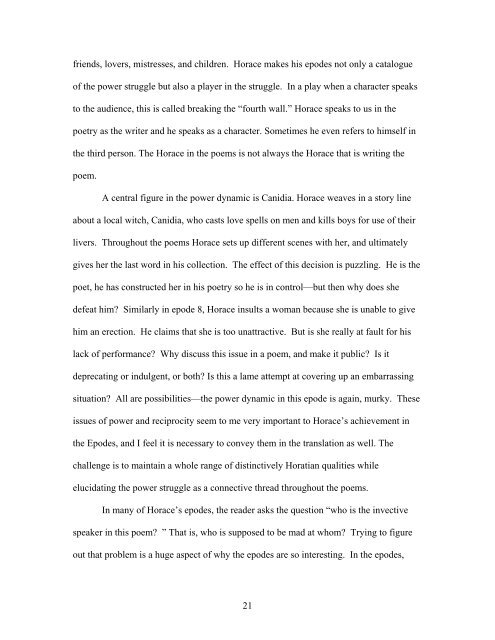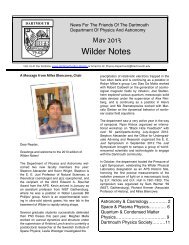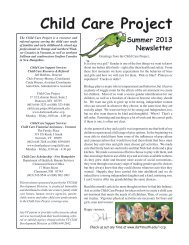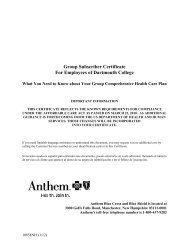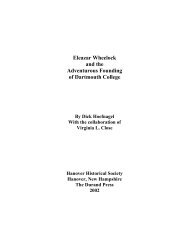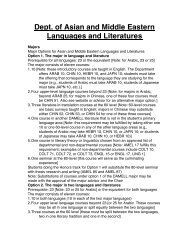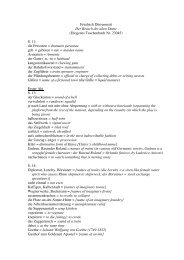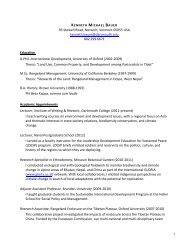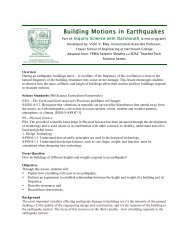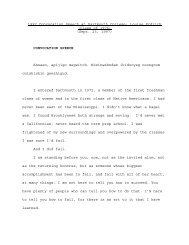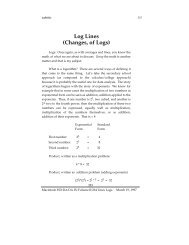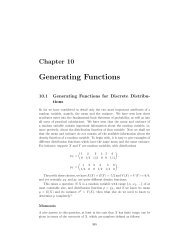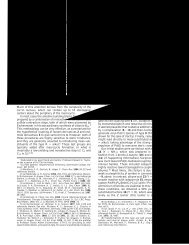A Log Cabin Out of Stone: - Dartmouth College
A Log Cabin Out of Stone: - Dartmouth College
A Log Cabin Out of Stone: - Dartmouth College
You also want an ePaper? Increase the reach of your titles
YUMPU automatically turns print PDFs into web optimized ePapers that Google loves.
friends, lovers, mistresses, and children. Horace makes his epodes not only a catalogue<br />
<strong>of</strong> the power struggle but also a player in the struggle. In a play when a character speaks<br />
to the audience, this is called breaking the “fourth wall.” Horace speaks to us in the<br />
poetry as the writer and he speaks as a character. Sometimes he even refers to himself in<br />
the third person. The Horace in the poems is not always the Horace that is writing the<br />
poem.<br />
A central figure in the power dynamic is Canidia. Horace weaves in a story line<br />
about a local witch, Canidia, who casts love spells on men and kills boys for use <strong>of</strong> their<br />
livers. Throughout the poems Horace sets up different scenes with her, and ultimately<br />
gives her the last word in his collection. The effect <strong>of</strong> this decision is puzzling. He is the<br />
poet, he has constructed her in his poetry so he is in control—but then why does she<br />
defeat him? Similarly in epode 8, Horace insults a woman because she is unable to give<br />
him an erection. He claims that she is too unattractive. But is she really at fault for his<br />
lack <strong>of</strong> performance? Why discuss this issue in a poem, and make it public? Is it<br />
deprecating or indulgent, or both? Is this a lame attempt at covering up an embarrassing<br />
situation? All are possibilities—the power dynamic in this epode is again, murky. These<br />
issues <strong>of</strong> power and reciprocity seem to me very important to Horace’s achievement in<br />
the Epodes, and I feel it is necessary to convey them in the translation as well. The<br />
challenge is to maintain a whole range <strong>of</strong> distinctively Horatian qualities while<br />
elucidating the power struggle as a connective thread throughout the poems.<br />
In many <strong>of</strong> Horace’s epodes, the reader asks the question “who is the invective<br />
speaker in this poem? ” That is, who is supposed to be mad at whom? Trying to figure<br />
out that problem is a huge aspect <strong>of</strong> why the epodes are so interesting. In the epodes,<br />
21


